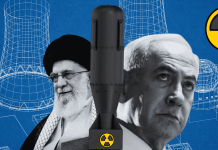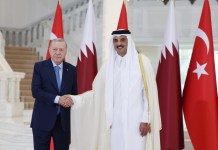Mohammed bin Zayed Al Nahyan (MBZ) or the 29-year-old young prince of the UAE with a negligible air-force came to the US for purchasing weapons. In 1991, post the Iraqi invasion of Kuwait, Mohammed bin Zayed was keen to purchase huge amounts of weaponry to defend his oil-rich kingdom. The US Congress was apprehensive such an elaborate purchase list might destabilize the middle-east, but Mohammed bin Zayed had different ideas. A report from The New York Times

But the Pentagon, trying to cultivate accommodating allies in the Gulf, had identified Mohammed bin Zayed as a promising partner. The favorite son of the semi-literate Bedouin who founded the United Arab Emirates, Prince Mohammed was a serious-minded, British-trained helicopter pilot who had persuaded his father to transfer $4 billion into the United States Treasury to help pay for the 1991 war in Iraq.
Richard A. Clarke, then an assistant secretary of state, reassured lawmakers that the young prince would never become “an aggressor.” “The U.A.E. is not now and never will be a threat to stability or peace in the region,” Mr. Clarke said in congressional testimony. “That is very hard to imagine. Indeed, the U.A.E. is a force for peace.”
Thirty years later, Prince Mohammed bin Zayed, now 58, crown prince of Abu Dhabi and de facto ruler of the United Arab Emirates, is arguably the most powerful leader in the Arab world. He is also among the most influential foreign voices in Washington, urging the United States to adopt his increasingly bellicose approach to the region.
Mohammed bin Zayed is almost unknown to the American public and his tiny country has fewer citizens than Rhode Island. But he may be the richest man in the world. He controls sovereign wealth funds worth $1.3 trillion, more than any other country.
His influence operation in Washington is legendary (Mr. Clarke got rich on his payroll). His military is the Arab world’s most potent, equipped through its work with the United States to conduct high-tech surveillance and combat operations far beyond its borders.
For decades, the prince has been a key American ally, following Washington’s lead, but now he is going his own way. His special forces are active in Yemen, Libya, Somalia and Egypt’s North Sinai. He has worked to thwart democratic transitions in the Middle East, helped install a reliable autocrat in Egypt and boosted a protégé to power in Saudi Arabia.
At times, the prince has contradicted American policy and destabilized neighbors. Rights groups have criticized him for jailing dissidents at home, for his role in creating a humanitarian crisis in Yemen, and for backing the Saudi prince whose agents killed the dissident writer Jamal Khashoggi.
Yet under the Trump administration, his influence in Washington appears greater than ever. He has a rapport with President Trump, who has frequently adopted the prince’s views on Qatar, Libya and Saudi Arabia, even over the advice of cabinet officials or senior national security staff.
Western diplomats who know Mohammed bin Zayed as M.B.Z. — say he is obsessed with two enemies, Iran and the Muslim Brotherhood. Mr. Trump has sought to move strongly against both and last week took steps to bypass congressional opposition to keep selling weapons to both Saudi Arabia and the United Arab Emirates.
“M.B.Z. has an extraordinary way of telling Americans his own interests but making it come across as good advice about the region,” said Ben Rhodes, a deputy national security adviser under President Barack Obama, whose sympathy for the Arab Spring and negotiations with Iran brought blistering criticism from the Emirati prince. When it comes to influence in Washington, Mr. Rhodes added, “M.B.Z. is in a class by himself.”
Mohammed bin Zayed worked assiduously before the presidential election to crack Mr. Trump’s inner circle, and secured a secret meeting during the transition period with the president’s son-in-law, Jared Kushner. The prince also tried to broker talks between the Trump administration and Russia, a gambit that later entangled him in the special counsel’s investigation into foreign election interference.
Today, at least five people working for Prince Mohammed have been caught up in criminal investigations growing out of that inquiry. A regular visitor to the United States for three decades, Prince Mohammed has now stayed away for two years, in part because he fears prosecutors might seek to question him or his aides, according to two people familiar with his thinking. (His brother, the foreign minister, has visited.)
The United Arab Emirates’ Embassy in Washington declined to comment. The prince’s many American defenders say it is only prudent of him to try to shape United States policy, as many governments do, and that he sees his interventions as an attempt to compensate for an American pullback.
But Prince Mohammed’s critics say that his rise is a study in unintended consequences. The obscure young prince whom Washington adopted as a pliant ally is now fanning his volatile region’s flames.
By arming the United Arab Emirates with such advanced surveillance technology, commandos and weaponry argued Tamara Cofman Wittes, a former State Department official and fellow at the Brookings Institution. “We have created a little Frankenstein.”
Mohammed bin Zayed – The Perfect Prince
Most Arab royals are paunchy, long-winded and prone to keep visitors waiting. Not Prince Mohammed. He graduated at the age of 18 from the British officers’ training program at Sandhurst. He stays slim and fit, trades tips with visitors about workout machines, and never arrives late for a meeting.
American officials invariably describe him as concise, inquisitive, even humble. He pours his own coffee, and to illustrate his love for America, sometimes tells visitors that he has taken his grandchildren to Disney World incognito.
He makes time for low-ranking American officials and greets senior dignitaries at the airport. With a shy, lopsided smile, he will offer a tour of his country, then climb into a helicopter to fly his guest over the skyscrapers and lagoons of Dubai and Abu Dhabi.
“There was always a ‘wow’ factor with M.B.Z.,” recalled Marcelle Wahba, a former American ambassador to the United Arab Emirates.
In the capital, Abu Dhabi, he has overseen a construction craze that has hidden the former coastline behind man-made islands. One is intended to become a financial district akin to Wall Street. Another includes a campus of New York University, a franchise of the Louvre and a planned extension of the Guggenheim.
When he meets Americans, Prince Mohammed emphasizes the things that make the United Arab Emirates more liberal than their neighbors. Women have more opportunities: A third of the cabinet ministers are female.
Unlike Saudi Arabia, the United Arab Emirates allow Christian churches and Hindu or Sikh temples, partly to accommodate a vast foreign workforce. (The country is estimated to have nine million residents, but fewer than a million citizens; the rest are foreign workers.)
To underscore the point, the prince last year created a Ministry of Tolerance and declared this the “Year of Tolerance.” He has hosted the Special Olympics and Pope Francis.
The United Arab Emirates are a tiny federation of city-states, yet Abu Dhabi alone accounts for 6 percent of the world’s proven oil reserves, making it a tempting target to a larger neighbor like Iran. In 1971, when the U.A.E. gained independence from Britain, the Shah of Iran seized three disputed Persian Gulf islands.
The Muslim Brotherhood, a 90-year-old Islamist movement founded in Egypt, has become mainstream in many Arab countries. On that subject, Prince Mohammed says his dread is more personal.
His father assigned a prominent Brotherhood member, Ezzedine Ibrahim, as Prince Mohammed’s tutor, and he attempted an indoctrination that backfired, the prince often says.
“I am an Arab, I am a Muslim and I pray. And in the 1970s and early 1980s I was one of them,” Prince Mohammed told visiting American diplomats in 2007, as they reported in a classified cable released by WikiLeaks. “I believe these guys have an agenda.”
He worries about the appeal of Islamist politics to his population. As many as 80 percent of the soldiers in his forces would answer the call of “some holy man in Mecca,” he once told American diplomats, according to a cable released by WikiLeaks.
For that reason, diplomats say, Prince Mohammed has long argued that the Arab world is not ready for democracy. Islamists would win any elections. “In any Muslim country, you will see the same result,” he said in a 2007 meeting with American officials. “The Middle East is not California.”
The United Arab Emirates began allowing American forces to operate from bases inside the country during the Persian Gulf war of 1991. Since then, the prince’s commandos and air forces have been deployed with the Americans in Kosovo, Somalia, Afghanistan and Libya, as well as against the Islamic State.
He has recruited American commanders to run his military and former spies to set up his intelligence services. He also acquired more weaponry in the four years before 2010 than the other five Gulf monarchies combined, including 80 F-16 fighters, 30 Apache combat helicopters, and 62 French Mirage jets.
With advice from former top military commanders including former Secretary of Defense James Mattis and General Allen, Prince Mohammed has even developed an Emirati defense industry, producing an amphibious armored vehicle known as The Beast and others that he is already supplying to clients in Libya and Egypt.
The United Arab Emirates are also preparing a low-altitude propeller-driven bomber for counterinsurgency combat — an idea Mr. Mattis had long recommended for the United States, a former officer close to him said.
Prince Mohammed has often told American officials that he saw Israel as an ally against Iran and the Muslim Brotherhood. Israel trusted him enough to sell him upgrades for his F-16s, as well as advanced mobile phone spyware.
To many in Washington, Prince Mohammed had become America’s best friend in the region, a dutiful partner who could be counted on for tasks from countering Iranian influence in Lebanon to funding construction in Iraq. “It was well known that if you needed something done in the Middle East,” recalled Richard G. Olson, a former United States ambassador to Abu Dhabi, “the Emiratis would do it.”




